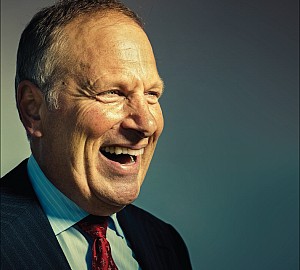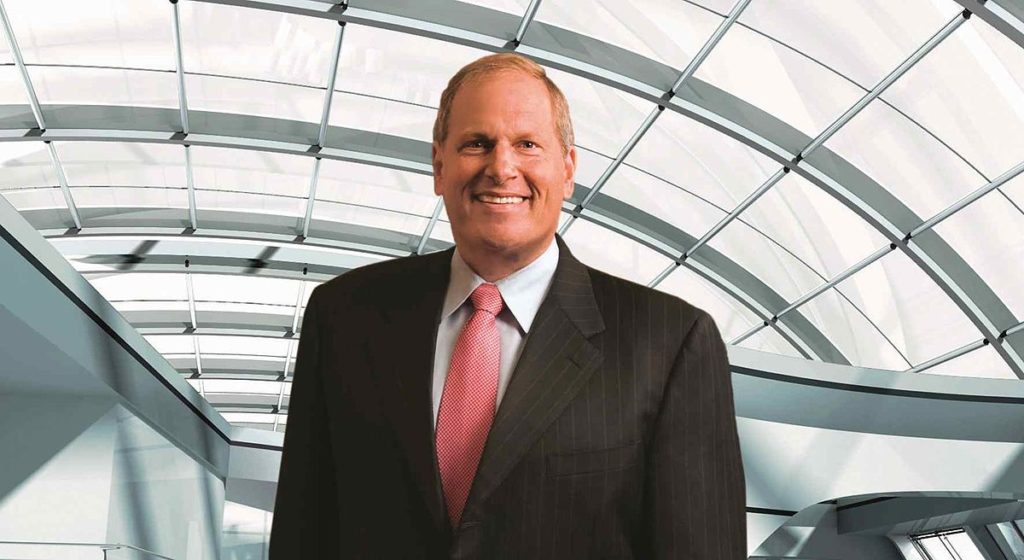#201 Dave Cote – Episode Notes

David Cote was formerly Chairman and CEO of industrial giant Honeywell and is currently Executive Chairman of Vertiv Holdings Co.
During 16 years as CEO and/or Chairman of Honeywell, he grew the company’s market capitalization from around $20 billion to nearly $120 billion, delivering returns of 800 percent and beating the S&P by nearly two and a half times.
Cote was named CEO of the Year by Chief Executive Magazine in 2013 and was recognized as one of the World’s Best CEOs by Barron’s for five straight years (2013-2017).
On this episode Dave shares his story of being the first in his family to graduate high school to becoming one of the best CEO’s in the world.
The life lessons Dave shares are ones you won’t want to miss!
03:15 UNH’s Gene Savage helped Cote start his career
Dave Cote didn’t have a lot of direction when he was young, but had plenty of ambition
- Quit school and tried various roles but realized he worked best in a classroom
- Decided to attend college at a school he had applied to before, University of New Hampshire, but was told he missed the admissions deadline and couldn’t enroll
- Drove to the school and decided to talk to the admissions director, Gene Savage
- When told he couldn’t meet with Savage without an appointment, Cote decided to just sit and wait until the director was free
- Cote’s initiative got him a chance to sit down with Savage, tell his story, apply with a new application, and be accepted
- Later on, Cote met up with Savage again and thanked him for getting him into UNH, and eventually Savage received the Pettee Medal, UNH’s highest honor, and asked Cote to present it
- “It brought the whole thing full circle. It, to me, showed what kind of guy he was and how important it was to just not always follow the rules, but just do what’s right about something.”
15:00 Game-changing Switch in Cote’s Life
Up until Cote went back to school the second time, he had no idea what his career was going to be and saw himself as a “screw-off”
- Worked an hourly job at General Electric working a punch press at 22 and when he found out his wife was pregnant, he knew he had to get his act together
- Spent the next year finding every way to improve himself and his family’s way of life
- Went from procrastinating like every other college student, to planning every aspect of what he needed to get done and when
- “It was a real eye opening experience for me. I’d say that year really put me on the course to having a career.”
- Spent the next year finding every way to improve himself and his family’s way of life
24:45 Advancing his Career
While working a new job at GE, Cote was required to do forms where he understood that there was not much use in them and decided to take it to his boss and associates and ask to skip over it
- Cote was voted down
Couple of months later, Cote is filling in for someone who usually does GE CEO Jack Welch’s board pitches and receives a call saying Welch wants to speak with Cote
- Welch catches Cote off guard with a question about the forms he sent out and when Cote answers yes, Welch orders him to come to his office immediately
- “{Welch] starts yelling and cursing at me asking why would I do such a stupid thing? I’m sitting there and having this out of body experience thinking, ‘I can’t believe I didn’t even want to do this. Now I’m having to defend it.’”
- Cote left that meeting believing he was going to be fired
- Two months go by and GE closes on an RCA deal and while celebrating, Welch calls over Cote again, with what Cote presumes is going to be his firing
- A friend of Cote’s informed Welch on how Cote initially recommended they turn down sending the forms in the first place
- Welch says, “Wow, you really took the knife for those guys?”
- Welch and the CFO were very astonished on how Cote reacted initially and impressed on protecting his associates
- From there, Cote was able to take jump after jump to advance his career after this moment
- A friend of Cote’s informed Welch on how Cote initially recommended they turn down sending the forms in the first place
33:20 Starting at Honeywell
First day at Honeywell was great for Cote, but as he got through Day 2, Day 3, and so on, the reality of how bad things were on the inside compared to the outside set in
- Cote had to deal with external forces saying, “We’re not sure this company can be turned around, and if it can, we don’t think this is the guy (referencing Cote) that can do it because he didn’t make it to the first tier in the GE succession race and he wasn’t even the first choice to run Honeywell.”
- The statements were true and led to Cote not having the most auspicious of starts
36:30 3 Essential Principles for Leadership
Ability to Mobilize a Large Group of People
- This principle is the most visible and the most readily available for people to draw attention to
- Only about 5% of the job as a leader
Good Judgment
- It’s about finding the right direction and path for your company
Move People in the Right Direction
- It’s easy to say “you’re doing it” and moving, but even harder to actually move in the direction you have outlined for your company
Cote was able to use these principles to build success within Honeywell
- When it came to decision-making, Cote wanted all the facts and opinions out on the table
- “I was always much more focused on am I making the right decision than I was with am I right?”
- At every meeting, Cote always wanted to be right at the end when decisions were finalized versus at the beginning
- This helps ensure everyone has an opportunity to get their voices and recommendations heard
- “You’re trying to build a mosaic. It’s not as pretty as a painting. It’s more like you’re trying to fit in all these pieces to figure out what’s the right decision here.”
40:40 Cote’s “Superhuman” Skills
“Independent thinking is a lot more rare than being smart.”
- With certain upbringing and education, there are plenty of smart people but it’s harder to find those who are able to think and make decisions themselves
- Cote sees the key to independent thinking as constantly asking questions and pushing past what others might presume as fact
Being able to manage time and productivity is also something that is critical for Cote
- He enjoys the quote from Donald Rumsfeld, “Beware of letting the urgent groups get in the way of the important.”
- Once Cote reached the CEO level, he realized he was going to have to work to come up with new ways to keep things going
- On the days where Cote had time to stop outside of his schedule, he would practice free thinking; just sitting there with a notebook and letting things come to his mind
48:50 Even Leaders have Doubts
Leadership doesn’t always come with absolute certainty
- “In terms of what the organization sees, they have to be absolutely confident that the leader is absolutely confident in their decisions. Organizations cannot handle ambiguity.”
- Cote stresses the importance of checking back on your decisions and asking, “was I right?”
- Throughout working at Honeywell, Cote was always doubling back to check his decisions with plans and others to really understand if he was making the right calls
- Cote believes it’s important to have others poke holes in your own thinking to help enlighten your blindspots
58:15 Get Inputs from Others
When handling big decisions, Cote would not make it known what his position was to those who were helping reach a decision
- “I would make a point of drawing everybody out, asking every single person around the table, introvert or extrovert, what they thought.”
- He would start with the most junior to the most senior
- At the end, he would state his position just so all opinions had been shared and they could then understand Cote’s decision
01:06:30 Short Term Gains vs. Long Term Gains
“Success is not about achieving one thing, it’s about achieving two seemingly conflicting things at the same time.”
- Cote understands that it’s important that you have to continually work to achieve both short term goals and long term goals
- “You need to be doing the seed planting to have the long term, because if you don’t, the long term becomes the short term and you’re stuck. But you also need short term results because it’s a validation of are you on the right long term path?”

